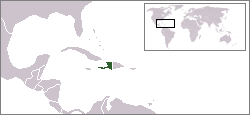This is an old revision of this page, as edited by Drz~enwiki (talk | contribs) at 23:39, 24 February 2004 (further wikification). The present address (URL) is a permanent link to this revision, which may differ significantly from the current revision.
Revision as of 23:39, 24 February 2004 by Drz~enwiki (talk | contribs) (further wikification)(diff) ← Previous revision | Latest revision (diff) | Newer revision → (diff)
| |||||
| National motto: L'Union Fait La Force (French, Union Makes Strength) | |||||
 | |||||
| Official languages | French, Creole | ||||
| Capital | Port-au-Prince | ||||
| President | Jean-Bertrand Aristide | ||||
| Area - Total - % water |
Ranked 143rd 27,750 km² 0.7% | ||||
| Population - Total (Year) - Density |
Ranked 92nd 7.5 million (July 2003) 271/km² | ||||
| GDP - Total (Year) - GDP/head |
$10.6 billion (2002) $1,400 | ||||
| Currency | Gourde (HTG) | ||||
| Time zone | UTC -5 (no DST) | ||||
| Independence - Declared - Recognised |
(from France) January 1, 1804 1825 (Fr), 1863 (USA) | ||||
| National anthem | La Dessalienne | ||||
| Internet TLD | .ht | ||||
| Calling Code | 509 | ||||
Haiti is situated on the western third of the island of Hispaniola in the Caribbean Sea, east of Cuba. A former French colony, it was one of the first countries of the Americas, after the United States, to declare its independence. Its capital is Port-au-Prince.
History
Main article: History of Haiti
The Hispaniola's indigenous Arawak (or Taíno) population suffered near-extinction in the decades after Christopher Columbus's arrival in 1492. The island was eventually repopulated by the late 17th century with African slaves to work the sugar plantations.
In 1697 Spain ceded the western third of the Hispaniola - which was then called Saint-Domingue - to France. It became one of the richest colonies in the 18th century French empire. On August 22, 1791 the slave population revolted, which lead to a war of attrition against the French. They defeated an army sent by Napoléon Bonaparte and declared independence on January 1, 1804.
Haiti has since become the poorest country in the Western Hemisphere and has been plagued by political violence and corrupt dictators for most of its history. Over three decades of dictatorship followed by military rule ended in 1990 when Jean-Bertrand Aristide was elected president. Most of his term was usurped by a military coup d'etat, but he was able to return to office in 1994 and oversee the installation of a close associate to the presidency in 1996.
In 2000, Aristide was elected president in a process some claim was rigged. Resentment over this and widespread corruption boiled over on February 5, 2004, when a armed rebel group calling itself the Revolutionary Artibonite Resistance Front took control of the Gonaïves police station. This rebellion then spread throughout the central Artibonite province by February 17 and was joined by opponents of the government who had been in exile in the Dominican Republic.
Politics
Main article: Politics of Haiti
Geography
Main article: Geography of Haiti
Economy
Main article: Economy of Haiti
About 80% of the population lives in abject poverty. Nearly 70% of all Haitians depend on the agriculture sector, which consists mainly of small-scale subsistence farming and employs about two-thirds of the economically active work force. The country has experienced little job creation since President René Préval took office in February 1996, although the informal economy is growing. Failure to reach agreements with international sponsors have denied Haiti badly needed budget and development assistance.
Demographics
Main article: Demographics of Haiti
Although Haiti averages about 270 people per square kilometer, its population is concentrated most heavily in urban areas, coastal plains, and valleys. About 95% of Haitians are of African descent. The rest of the population is mostly of mixed Caucasian-African ancestry. A few are of European or Levantine heritage. About two thirds of the population live in rural areas.
French is one of two official languages, but it is spoken by only about 10% of the people. All Haitians speak Creole, the country's other official language. English is increasingly spoken among the young and in the business sector.
Culture
Main articles: Culture of Haiti, Music of Haiti
Miscellaneous topics